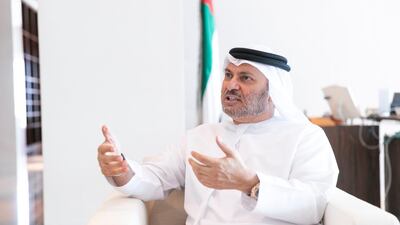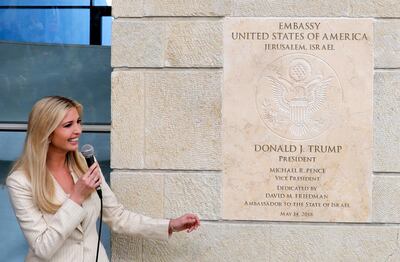The UAE's Minister of State for Foreign Affairs Dr Anwar Gargash has said there will be no backing down over a year-long boycott of Qatar, saying the onus is on Doha to change its policies.
In an exclusive and wide-ranging interview with The National addressing regional affairs, he said a "deficit of trust" with Qatar persists, and the UAE and its allies had become accustomed to not having relations with the peninsula.
His comments came on the first anniversary of the action against Qatar by the UAE, Saudi Arabia, Bahrain and Egypt.
____________
Listen: Dr Gargash on Beyond the Headlines
____________
Dr Gargash said Qatar had caused harm in the region, accusing its leaders of "undermining the Bahraini regime" and of "systematically supporting Saudi opposition" by providing a "platform to try and play a seditious role".
Referring to the decision to boycott Qatar on June 5 last year, he said: "The four countries have made their point. They don't have to escalate. We have become more or less accustomed to dealing with our region through isolation of Qatar. The onus is on Qatar if it really wants to come out of its current isolation."
The four countries, known as the Quartet, cited Qatar's support for terrorist organisations, close links to Iran and a reneging on commitments made in a private meeting in 2013, known as the Riyadh agreement, as the reason for breaking off relations.
Dr Gargash said the boycott had not been a sudden decision and consequently any end to the crisis may also be far off.
"It is one year since we took measures, against Qatar. There was a build up to it. It wasn't an issue that came as a thunderbolt striking. The crisis was due to Qatari practices over a decade where Qatar was part of the GCC. At the same time they adopted and pursued policies that were destabilising. The crisis did not come from nowhere. The reading from our perspective: we had a spoiler within our group."
The Quartet at the time of the boycott listed 13 demands – presented to the Qataris by Kuwait, which is helping mediate the crisis.
Dr Gargash said those points remained a starting point for a negotiation.
Specifically, for relations to be restored Qatar must "review its previous policies with regards to supporting extremism", its "destabilising role to its neighbours and its support for jihadism and radicalism".
____________
Read more
Qatar crisis: One year on, what's changed?
Qatar crisis: 4 Arab countries with varied grievances
Qatar dispute exposes Washington's limited influence on inter-regional conflict
____________
Despite numerous moves in Washington to mediate, Dr Gargash echoed Saudi Arabia's stance on a regional solution being necessary.
"The Qataris have a sort of misperception, where they thought Washington or another western power would call all parties to a meeting and will enforce a solution. Things don't work that way. That's why we have to come and say 'it has to be within the GCC'."
Dr Gargash also echoed the Quartet's policy in a letter to British MPs, in which he listed "examples of Qatar's continued support for extremism and terrorism and its growing links with the Iranian Revolutionary Guard".
"Qatar cannot dispute these statements; but it can change its policies and end this crisis. We hope that it will," he added.
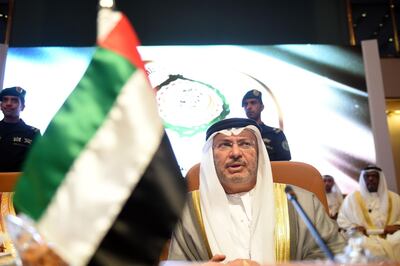
In his office in Abu Dhabi, Minister of State for Foreign Affairs Dr Anwar Gargash is resolute about how the UAE and its allies have handled various crises affecting the Middle East. Action was taken against Qatar a year ago because it had to be taken, he says. Iran remains a problem in Yemen that is being addressed by military action, as part of an Arab coalition.
However he concedes that Syria – whose civil war is in its eighth year – has been a failure of diplomacy by the international community and the Arab world. He says the conflict, in which more than 500,000 have been killed and millions displaced, is likely to continue and that the expulsion of Syria from the Arab League was a mistake.
Similarly, the relocation to Jerusalem of the US Embassy in Israel is something that should have happened at the end of a peace process, not the beginning, he adds.
The decision by the UAE, Saudi Arabia, Egypt and Bahrain to boycott Qatar is secondary to such crises, Dr Gargash insists.
America's exit from the Iran nuclear deal was positive and a sign that efforts to address Tehran's regional behaviour are better than a year ago, he argues.
But looking to the future the one constant in whatever diplomatic choices are made is that there will be difficulties.
"We are saying that if you don't want regional intervention in Arab affairs you need to rearrange your house," Dr Gargash says.
"Rearranging your house means you have to create consensus on crisis."
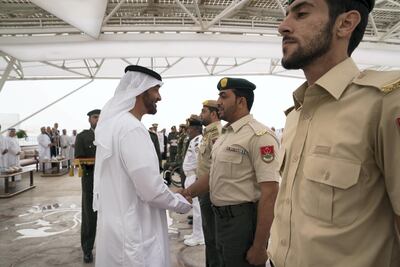
The concerns facing the Arab world, he says, can only be dealt with by what he calls a moderate "Arab Centre", capable of dealing with a world that has become more turbulent and complicated than ever before.
At the heart of that centre are two pillars of the Arab world: Egypt and Saudi Arabia. What is required, Dr Gargash says, is the broader support of other Arab countries in the region and their alignment in addressing problems, including steps that Iran took in recent years to increase its sphere of influence in war-torn Arab countries such as Syria, where President Bashar Al Assad's regime looks set to survive.
"We have to be more responsible for our fate. But we cannot do it as the UAE alone. We do need to create an Arab centre," Dr Gargash says.
Yemen
Dr Gargash maintains that although the UAE is militarily committed in Yemen as part of the Arab Coalition that intervened on behalf of the country's internationally recognised government, their policies have always created room for a political solution.
"Politically, there is a necessity to back the UN effort. It will ultimately mean a transition, to a new political order in Yemen. Clearly with the UN effort, the military and political process will see the Houthis pull out of urban centres."
UN special envoy to Yemen Martin Griffiths is to present a peace plan to the Security Council on June 18.
At the same time, Dr Gargash says, the political process must involve all Yemenis. Mr Griffiths's plan is widely expected to include some form of Houthi inclusion in government, despite the Iran-backed rebels being held accountable for undermining previous peace talks in Kuwait in 2016.
"The Houthis have been the main impediment to reaching an agreement but with the pressure we are putting in Hodeidah, and their regression, following the death of Ali Abdullah Saleh. I think we are more and more clear; we are changing the calculus through military pressure in order to bring about a political solution." A "UN-led, Yemeni-driven solution," according to Dr Gargash.
The Arab Coalition, who have been fighting on behalf of President Abdurabu Mansur Hadi since 2015, are on the brink of a huge breakthrough, being within less than 10 kilometres of Hodeidah, the second-most important city under the Houthis' control.
The pressure applied on the rebels, Dr Gargash says, will bring the Houthis to the table but only under the condition that they pull out of all urban centres before dialogue. Until they do so, Yemen will remain in a vulnerable position.
"This needs a UN process and will need a Yemeni dialogue because you're not talking about getting out of the current crisis but you're talking about Yemen in the next 10 to 20 years."
Syria
Dr Gargash believes the war in Syria is set to continue, with few good options available.
"Currently, countries involved in Syria are found in a situation whereby support of one side will likely result in the sponsorship of terrorist entities," Dr Gargash says.
"The other (would involve) complicity with a leader who's been responsible for the Arab world's worst humanitarian crisis.
"The choice between Al Qaeda-based opposition, or Assad is a false choice, don't try to present us with this choice. We think a political process is the option, because only a political process will resolve the crisis in Syria and there has been a failure of diplomacy in Syria," he says.
However, the Arab role in bringing about a political solution has been limited, compounded by the expulsion of Syria from the Arab League. As a result, Iran, Turkey and other non-Arab countries, notably Russia, took an increasingly prominent role in Syria.
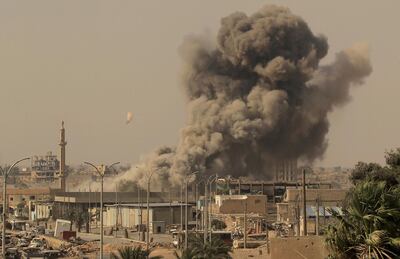
"I think it was a mistake to kick Syria out of the Arab league, it meant we had no political leverage at all, no open channel, we could not present an Arab prism to how the Syrian issue should be resolved," says Dr Gargash.
That decision meant Arab powers found themselves excluded from meetings on Syria. Turkey, Russia and Iran – three countries whose presence in Syria remains troubling to Arab countries and the United States – created their own "Astana peace process", an effort that has foundered in parallel to a UN-backed effort at ending Syria's civil war.
However, allowing Syria back into the Arab League would also present the 21 other member states with a dilemma.
"We are in a conundrum because readmitting Syria into the Arab League would create a lot of fissures," says Dr Gargash.
"At the same time admitting Syria in without igniting a real political process would perhaps create more complexities."
One of those complexities is Russia's involvement in Syria alongside Iran.
Russia's goal, says Dr Gargash, is to support President Al Assad but also to use Moscow's growing influence in the Arab world to purge the region of terrorism without having a long-term military engagement in the region. Iran, however, has alternative motives, he argued.
"Iran's interest is different. It is trying to create a sphere of influence in Syria, part of a creeping Iranian geostrategic plan in the Arab world that we've seen in Iraq and Lebanon, they have attempted that in Bahrain and Yemen," he adds.
Iran
Dr Gargash says that US President Donald Trump's administration is more closely aligned with the Arab world's view of regional crisis than that of his predecessor Barack Obama, especially when it comes to Iran.
He said they understand that the American policy of supporting a stable Egypt and Saudi Arabia forms the absolute core of ensuring security in the Middle East.
More importantly, Washington's stance on Iran has dusted off a red line on Tehran that he says had been crossed in recent years.
"We think the American administration got it right," he says, addressing Mr Trump's decision to unilaterally pull out of the Iran nuclear deal.
"We saw an Iran that was emboldened in the 2015 agreement, Iran would have never dreamed of using its own ballistic missiles in Arab theatres in such a callous and irresponsible way," he notes, referring to Yemen and Tehran's support for the Houthi rebels.
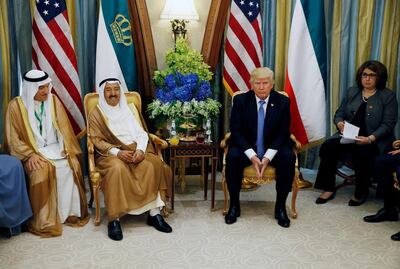
"I think what we're seeing is a clearer American understanding that you can’t trust this regime in Iran," he adds.
Doing so would be a grave concern for the region, and one that could have devolved into a nuclear arms race.
"I understand people are saying the JCPOA (Joint Comprehensive Plan of Action) is not about regional politics," says, referring to the 2015 agreement by its full name. "But that's not how it was sold to us. It was sold to us as a nuclear deal with Iran that would allow Iran to be more integrated into the global economy."
The previous Barack Obama administration worked on convincing their allies in the Arab world that the move to support the Iran nuclear deal would fold Tehran in the international community and prompt them to act more a responsible regional player.
"That was very naive. That never happened," says Dr Gargash.
But although the United States, under the Trump administration, has aligned itself increasingly more so with the GCC powers on Iran, differences with Washington remain.
Israel and Palestine
"We have disagreements with the US, over the Middle East peace process," says Dr Gargash. "We think the decision to move the American embassy to Jerusalem undermines a feeble two-state solution."
If the Trump administration continues with this approach to the Palestinian issue it will end badly. Dr Gargash predicted that the prospect of a two state solution had five to seven years before it would be obsolete.
"A solution is on its last legs," he says, adding that it could be replaced instead with a less popular one-state solution that many Arabs believe would systematically marginalise Palestinians.
The recent protests by Palestinians close to the border with Israel in which more than 120 people have been killed, largely by Israeli army sniper fire, and the simultaneous move of the US embassy from Tel Aviv to Jerusalem further complicate the situation, potentially hobbling a peace plan.
"This is perhaps the big tragedy," said Dr Gargash, calling the recent deaths "a massacre".
"There is an international consensus on the outlines of an agreement, and we do feel moving the embassy should be something at the end of the process. Not right now because it becomes an impediment to the process."
Yet the US is still crucial to any peace plan despite compromising their position by moving their embassy. That step was not only widely condemned by the international community but also contradicted decades of US policy on Palestine.
"We can't discount the United States. There is no other credible interlocutor, or player, in this, other than a clear American role," Dr Gargash said. "The Europeans will help but they will be the first to tell you an American role is essential, so clearly, while we do have disagreement with how the US has taken some of these steps to move the embassy, the US remains critical to this process."
He also said the Arab Peace plan remains relevant to the process, and he urged countries in the Arab world against reacting to the recent violence in Gaza, saying violence has not solved the concerns of Palestinians.
"The real solution is present in the Arab peace plan, in our ability to take the moral high ground and push diplomatically and to create pressure. I don't see giving it up as an option, and I don't see violence as an option."
He urged all parties concerned to reserve their judgement until the peace plan is presented, despite it taking longer than originally promised.
Iraq
The recent elections in Iraq, although surprising, are an indicator that the Arab world is moving away from viewing its problems through a sectarian lens, Dr Gargash says.
Shiite cleric Moqtada Al Sadr, whose coalition won the largest number of seats in parliament, has sought to reassure Iraqis about their next government, adding it will be "inclusive" and mindful of their needs.
Much of the rhetoric coming out of Iraq is staunchly opposed to Iran's influence in the country, indicating a strengthening Iraqi identity that can cut through sectarian divides, he argued.
"This brings us back, to the view of the UAE on the nature of sectarian politics that we have seen govern the region in the last 10 years. Because if you come to Arab Shias, and describe their sectarian identity as Iranian, you are already saying I've lost you," Dr Gargash says.
Instead, the Arab world needs to become more tolerant of differing views of Iraq, as a country of various religious denominations and affiliations.
"This is part and parcel of our approach... to extract the region from looking at the region from a sectarian prism. That has been, in my opinion, a failure which led to more violence and weakened the Arab world fundamentally.
"While Iran still has the messianic sectarian view to be the major regional power, I would argue that Iran is getting its own blows and it’s not a linear progression. We see that. The more we can support an Arab Centre, the more we can get agreement in Arab countries, that regardless of our own feuds, it should not entail intervention."
